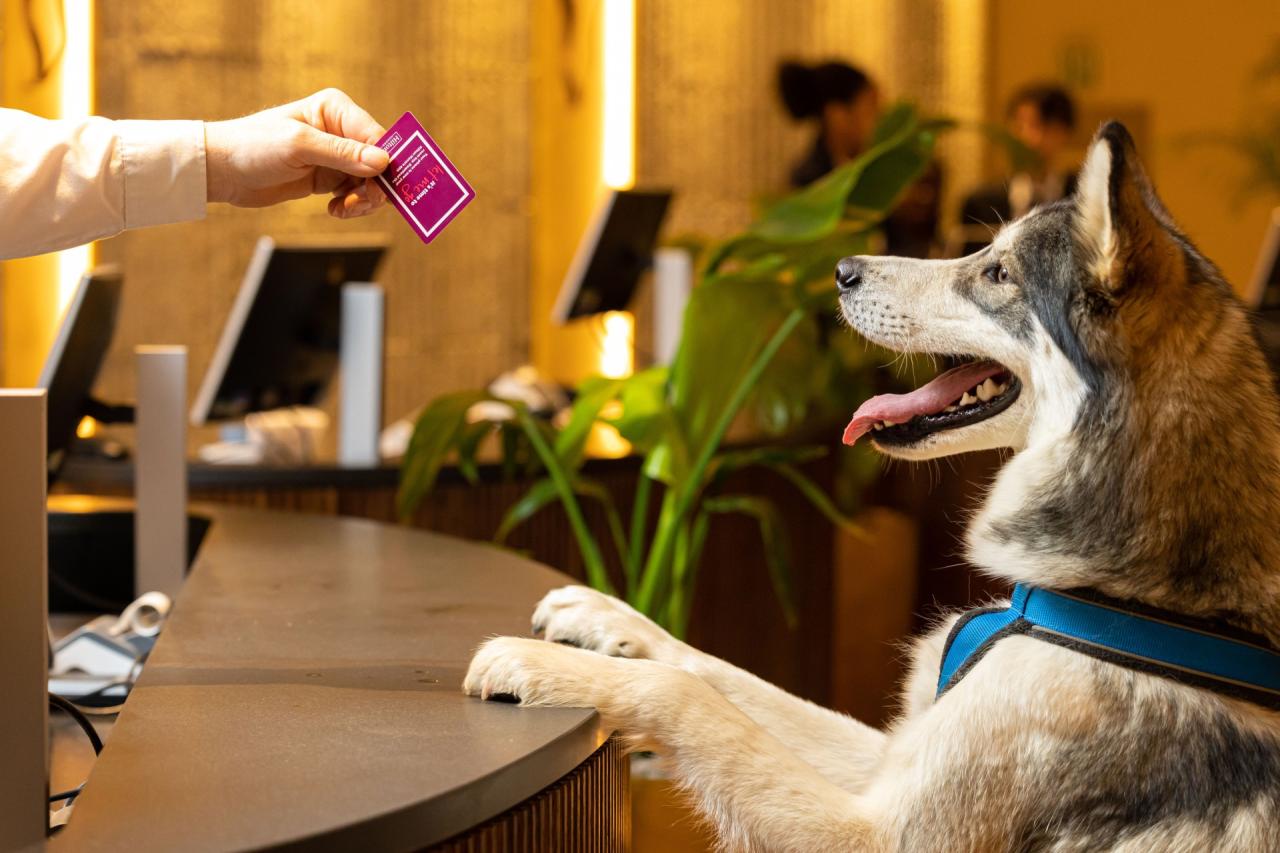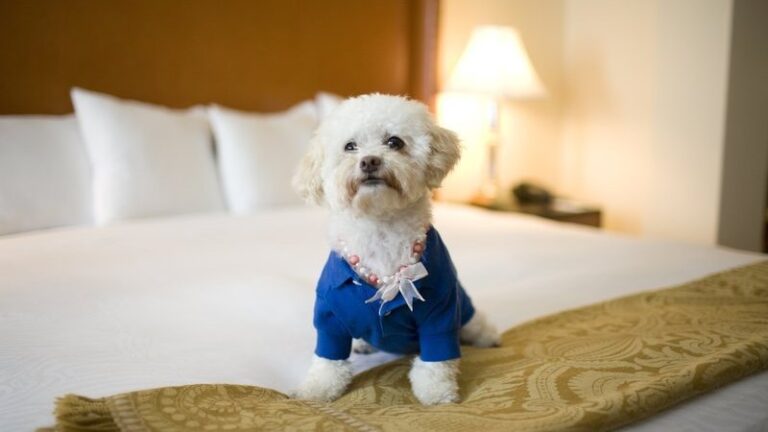For a growing number of travelers, leaving their beloved pets behind is simply not an option. This shift in mindset has led to the remarkable rise of pet-friendly hotels, establishments that not only welcome furry companions but actively cater to their needs, ensuring a comfortable, enjoyable, and often luxurious experience for both pets and their human companions. Gone are the days when “pet-friendly” merely meant “pets tolerated”; today’s leading hotels are rolling out the red carpet for four-legged guests, recognizing them as integral members of the family unit. This comprehensive guide will delve into the expanding world of pet-friendly hospitality, exploring what defines these unique accommodations, the specialized services they offer, and their profound impact on the evolving landscape of travel.
The Evolution of Pet-Friendly Hospitality

What was once a niche offering has blossomed into a significant segment of the hospitality industry, driven by demographic shifts and a deeper understanding of the human-animal bond.
A. From “Pets Tolerated” to “Pets Welcome”
The journey of pet-friendly hotels has evolved dramatically. Initially, hotels that allowed pets often did so with numerous restrictions, hidden fees, and limited amenities, often relegating pet owners to less desirable rooms. Today, the philosophy has shifted to “pets welcome,” indicating a genuine embrace of animal guests. This transformation reflects:
A. Changing Demographics: A rising number of households consider pets as family members, leading to a strong desire to include them in travel experiences.
B. Increased Pet Ownership: The global increase in pet ownership, particularly during and after the pandemic, has created a larger market for pet-inclusive travel.
C. Recognition of Pet Needs: Hotels now understand that catering to pets properly requires specific amenities and services, not just permission to enter.
This cultural shift has compelled the hospitality industry to adapt and innovate, recognizing the immense potential of the pet-travel market.
B. Dedicated Pet Amenities and Services
True pet-friendly hotels go far beyond simply allowing pets. They offer a suite of dedicated pet amenities and services designed to enhance the pet’s stay.
A. In-Room Comforts: This typically includes comfortable pet beds, food and water bowls, and sometimes welcome kits with treats, toys, or waste bags upon arrival. Some hotels even offer specialty pet menus for in-room dining.
B. Designated Pet Relief Areas: Conveniently located outdoor spaces for pets to relieve themselves, often with waste stations. Some urban hotels might even feature enclosed dog parks or rooftop pet play areas.
C. Pet Concierge Services: Knowledgeable staff who can provide information on local pet-friendly parks, walking trails, vets, groomers, and pet supply stores. Some hotels even offer services like dog walking or pet-sitting.
D. Specialized Pet Programs: Some high-end properties offer unique programs like pet massages, dog yoga (doga), or even pet-focused events and social hours.
E. Grooming and Wash Stations: For active pets, dedicated areas for washing off mud or sand, especially common in hotels near beaches or hiking trails.
C. Thoughtful Room Assignments and Design
While pets are welcome, their presence is managed thoughtfully to ensure the comfort of all guests. Thoughtful room assignments and design considerations are key.
A. Designated Pet Floors/Rooms: Hotels often assign pet owners to specific floors or a block of rooms to minimize potential disturbances for guests with allergies or those who prefer a pet-free environment.
B. Durable and Easy-to-Clean Materials: Rooms designated for pets often feature hard flooring (tile, laminate) rather than carpets, and durable, easy-to-clean furniture.
C. Minimizing Noise: Rooms may be located in quieter areas of the hotel, or feature enhanced soundproofing to mitigate barking or other pet noises.
D. Ground Floor Access: For dog owners, ground floor rooms with easy access to outdoor relief areas are often preferred and specifically offered.
D. Clear Pet Policies and Guidelines
Transparency and clear communication are vital. Reputable pet-friendly hotels provide clear pet policies and guidelines to ensure a harmonious stay for everyone. These typically cover:
A. Pet Size and Breed Restrictions: Some hotels have limits on pet size or restrictions on certain breeds due to insurance or safety concerns.
B. Number of Pets Allowed: A maximum number of pets per room is common.
C. Pet Fees: Most hotels charge a non-refundable pet fee (per stay or per night) to cover additional cleaning costs. Some luxury properties may offer “perks” that reduce or waive this fee for loyalty members.
D. Leash Requirements: Rules about pets being leashed in public areas of the hotel.
E. Unattended Pet Policies: Guidelines on leaving pets unattended in rooms (e.g., requiring pets to be crated, or specific times when pets cannot be left alone).
F. Damage Responsibility: Clear statements on pet owner responsibility for any damages caused by their pet.
E. Health and Safety Considerations
For the well-being of both pets and humans, pet-friendly hotels prioritize health and safety considerations.
A. Cleanliness Protocols: Enhanced cleaning and sanitization procedures for pet-friendly rooms to remove dander and allergens, ensuring a fresh environment for subsequent guests.
B. Vaccination Requirements: Some hotels may request proof of up-to-date vaccinations for pets.
C. Emergency Veterinary Information: Readily available contact information for local veterinarians or emergency animal hospitals.
D. Pest Control: Robust pest control measures to prevent fleas or other pests.
E. Safe Public Areas: Ensuring public areas are free of hazards for pets, such as toxic plants or accessible cleaning chemicals.
The Growing Market and Economic Impact

The pet-friendly hotel market is a booming segment, driven by a powerful consumer trend and contributing significantly to the tourism economy.
A. A Lucrative and Growing Market Segment
The pet-travel market represents a lucrative and growing market segment. Pet owners, often with higher disposable incomes, are willing to spend extra to travel with their companions. This creates a loyal customer base, as positive experiences with a pet-friendly hotel can lead to strong repeat business and positive word-of-mouth referrals. The market has expanded beyond just dog owners to include cat owners and even those with smaller, exotic pets.
B. Increased Occupancy and Revenue Streams
By opening their doors to pets, hotels can significantly increase occupancy rates, especially during off-peak seasons when pet owners might be more likely to travel. The addition of pet fees and optional pet services (like pet sitting or specialized meals) also creates valuable new revenue streams that boost profitability.
C. Enhanced Brand Image and Competitive Advantage
Being genuinely pet-friendly can greatly enhance a hotel’s brand image and provide a strong competitive advantage. It portrays the hotel as inclusive, compassionate, and attentive to diverse guest needs. This positive perception can attract not only pet owners but also travelers who appreciate a welcoming and thoughtful environment.
D. Supporting Local Pet-Related Businesses
Pet-friendly hotels often form partnerships with local pet-related businesses, such as pet supply stores, groomers, dog walkers, and veterinary clinics. This collaboration creates a synergistic effect, supporting the local economy beyond the hotel’s direct operations and enriching the pet-friendly ecosystem of the destination.
E. Marketing and Social Media Opportunities
The highly visual nature of pet travel provides excellent marketing and social media opportunities. Photos and videos of happy pets enjoying their hotel stays are highly shareable content, generating organic reach and engagement. Many hotels encourage guests to post pictures of their pets, effectively turning guests into brand ambassadors. User-generated content featuring adorable animals is a powerful marketing tool.
Choosing the Best Pet-Friendly Hotel for Your Trip
Selecting the right pet-friendly hotel requires careful research to ensure a comfortable and safe experience for both you and your animal companion.
A. Understand the Hotel’s Specific Pet Policy
Never assume. Always thoroughly understand the hotel’s specific pet policy before booking. Look for details on:
A. Pet Fees: Are they per stay, per night, or per pet? Are they refundable?
B. Size/Breed Restrictions: Do they have limits on weight or exclude certain breeds?
C. Number of Pets: How many pets are allowed per room?
D. Unattended Policy: Can your pet be left alone in the room, and under what conditions (e.g., crated)?
E. Designated Areas: Are pets allowed in all public areas, or only specific zones? This information is often on their website or can be clarified by calling directly.
B. Read Pet-Specific Reviews and Feedback
Go beyond general hotel reviews and specifically search for pet-specific reviews and feedback. Sites like BringFido.com or filters on major OTAs can help. Look for comments on:
A. Staff Interaction: How friendly and accommodating were staff to pets?
B. Pet Amenities: Were the provided pet amenities (beds, bowls) clean and sufficient?
C. Pet Relief Areas: Were they convenient, clean, and well-maintained?
D. Noise Issues: Were there any issues with noise from other pets or guests?
E. Overall Pet Experience: Did other pet owners feel genuinely welcome?
C. Consider Location and Nearby Pet Amenities
Evaluate the location of the hotel in relation to nearby pet amenities.
A. Parks and Green Spaces: Is there a park or safe walking area nearby for your pet to exercise and relieve itself?
B. Veterinary Services: Is there an emergency vet clinic or a regular vet nearby in case of unexpected health issues?
C. Pet Stores: Are pet supply stores easily accessible for forgotten items or special treats?
D. Pet-Friendly Restaurants/Cafes: If you plan to dine out with your pet, are there options within walking distance?
D. Assess Room Type and Size for Your Pet
Think about the room type and size that will be most comfortable for your pet. If you have a large dog, a spacious room or suite on a ground floor with easy outdoor access might be preferable. For smaller pets, a standard room may suffice, but ensure it offers enough space for their crate or bed.
E. Evaluate Available Pet Services
Consider the available pet services offered by the hotel. Do they offer:
A. Dog Walking or Pet Sitting: If you plan activities where your pet cannot join.
B. Pet Spa or Grooming: For longer stays or special occasions.
C. Special Pet Menus: If you wish to treat your pet to in-room dining.
While some services may incur extra charges, they can significantly enhance your convenience and your pet’s comfort.
F. Inquire About Cleaning Protocols for Pet Rooms
For your peace of mind and to understand the pet fee, inquire about the cleaning protocols for pet rooms. This shows the hotel’s commitment to hygiene and explains why a pet fee might be charged. Knowing the rooms are thoroughly cleaned for dander and allergens can reassure guests with sensitivities.
The Future of Pet-Friendly Hospitality
The trajectory of pet-friendly hotels is towards even greater integration, personalization, and technological innovation, making travel with pets more seamless and enjoyable than ever before.
- Smart Pet Rooms: Future hotels might feature smart pet rooms with integrated pet cams (allowing owners to check on their pets remotely), automated feeders/water bowls, and even climate-controlled pet beds, providing optimal comfort and security.
- AI-Powered Pet Concierge: AI will enhance pet concierge services, offering personalized recommendations for local pet activities, vet services, and pet-friendly dining based on the specific pet’s breed, size, and activity level.
- Biometric Pet ID for Access: For highly integrated pet-friendly resorts, biometric pet ID (e.g., nose print or facial recognition for dogs) could enable seamless access to designated pet lounges, play areas, or even allow pets to independently enter their rooms.
- Specialized Pet Wellness Programs: An expansion of specialized pet wellness programs including on-site pet physiotherapists, advanced grooming services, and pet-specific dietary consultations, mirroring human wellness trends.
- Integrated Pet Transport Services: Hotels might partner more closely with pet-friendly airlines and transport services, offering seamless, door-to-door pet travel coordination as part of their booking packages.
- Virtual Vet Consultations: Access to virtual vet consultations directly from the hotel room, providing immediate professional advice for minor pet health concerns during travel.
- “Pet Passport” Digital Profiles: The creation of digital pet passports storing vaccination records, dietary needs, and behavioral notes, allowing hotels to provide even more tailored and safe experiences upon check-in.
- Sustainable Pet Practices: Eco-friendly pet amenities (biodegradable waste bags, organic treats), partnerships with sustainable pet food brands, and donation programs for local animal shelters will become standard, reflecting broader sustainability goals.
Conclusion
Pet-friendly hotels are not just a convenience; they represent a fundamental recognition of the bond between humans and their animal companions. By consistently innovating their offerings and embracing a truly inclusive approach, these establishments are transforming the travel experience, ensuring that every family, furry members included, can embark on unforgettable adventures together. The future of travel is increasingly paws-itive, making journeys more joyous and accessible for all.










